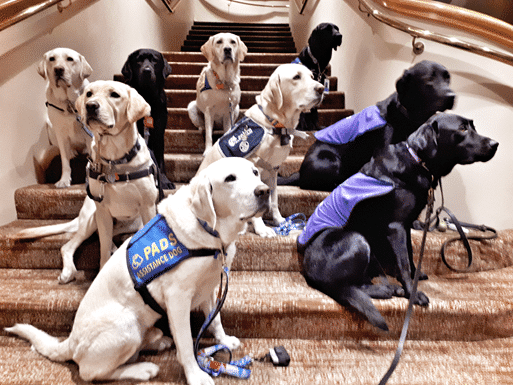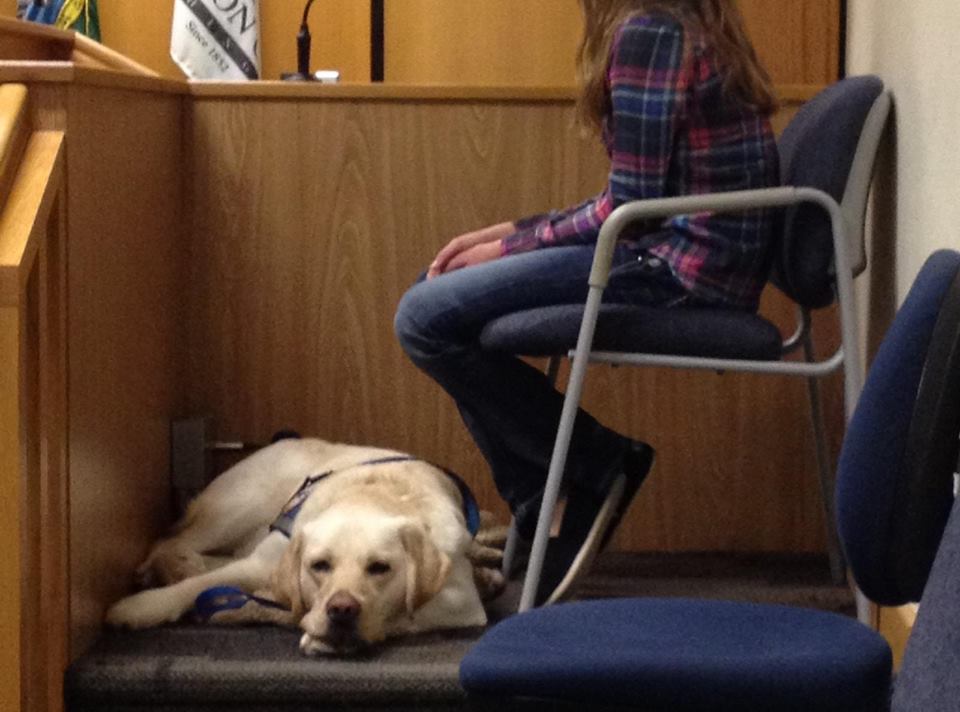The use of Accredited Facility Dogs (AFDs) is an increasingly popular aid in providing support for children and youth involved in the justice process. The dogs help provide reassurance and have a calming affect on young victims and witnesses during their court testimony, in forensic interviews, medical examinations, meetings with the prosecutor, while waiting to testify, and post-court services.


The Canadian Experience
In recent years, there has been a growing acceptance in Canadian courts for AFDs to provide support for child, youth and vulnerable adult witnesses. In 2014, the first dog to officially support a young witness while testifying was Hawk from the Calgary Police Victim Services Unit. Soon after, Wren, an AFD at the Zebra Child Protection Centre (Edmonton, AB) was permitted by the court to support a child witness.
In an oral judgement, the Court in Surrey, BC noted that Caber (now retired from Delta Police Services BC), as an Accredited Facility Dog trained by the Pacific Assistance Dog Society, was an appropriate animal to assist a witness (R. V. JLK [2015] B.C.J. No. 1055). The Supreme Court of British Columbia, allowing an application pursuant to s. 486.7 of the Criminal Code, noted that the presence of dogs, such as Caber, have a calming influence, and allows witnesses to “effectively communicate the evidence without creating interference or distraction” (R. V. Marchand, [2016] B.C.J. No. 1912). Since that time, there is additional case law for the use of Accredited Facility Dogs.
Since 2015, there have been numerous other examples of AFDs supporting young and vulnerable witnesses in courtrooms across the country. AFDs have been highlighted by the media in their own communities.
Training of these dogs takes a minimum of two years, and they are essentially trained from birth. The following Canadian organizations provide specialized training and accreditation for dogs:
Cope Service Dogs
Dogs with Wings
Lions Foundation of Canada Dog Guides
Mira Foundation
National Service Dogs
Guidelines
Although there is no specific section in the Criminal Code of Canada at the present time for an Accredited Facility Dog, a separate application can be submitted to the court for an Accredited Facility Dog to support a witness. Also, the Canadian Victims Bill of Rights, provides victims with the right to request testimonial aids, and has been used in support of applications for an Accredited Facility Dog.
- Terms are often used interchangeably to describe Accredited Facility Dogs, including: Courthouse Facility Dog and Court Support Dog. It is generally agreed that the term “Therapy Dog” should not be used.
- There is general agreement with respect to standards of behaviour for an AFD, including: dogs must be unobtrusive in the courtroom or testimony room; dogs must be able to remain still and calm for several hours; and dogs must not react if a witness becomes emotionally distressed. The majority of Canadian CAC/CYACs have chosen professionally trained, accredited dogs.
- The AFD typically sits at the feet of the witness during testimony.
- If possible, it is advantageous for the child/youth to meet the dog before any court-related proceedings.
- Most handlers are professionals in the justice system, and have received training for this role. Handlers should be skilled in working with vulnerable victims, have familiarity with the legal system, and are aware of appropriate courtroom behaviour.
For more information on AFDs in Canada, go to Justice Facility Dogs Canada: https://justicefacilitydogs.ca/
Although there is no specific section in the Criminal Code of Canada at the present time for an Accredited Facility Dog, a separate application can be submitted to the court for an Accredited Facility Dog to support a witness. Also, the Canadian Victims Bill of Rights, provides victims with the right to request testimonial aids, and has been used in support of applications for an Accredited Facility Dog.
- Terms are often used interchangeably to describe Accredited Facility Dogs, including: Courthouse Facility Dog and Court Support Dog. It is generally agreed that the term “Therapy Dog” should not be used.
- There is general agreement with respect to standards of behaviour for an AFD, including: dogs must be unobtrusive in the courtroom or testimony room; dogs must be able to remain still and calm for several hours; and dogs must not react if a witness becomes emotionally distressed. The majority of Canadian CAC/CYACs have chosen professionally trained, accredited dogs.
- The AFD typically sits at the feet of the witness during testimony.
- If possible, it is advantageous for the child/youth to meet the dog before any court-related proceedings.
- Most handlers are professionals in the justice system, and have received training for this role. Handlers should be skilled in working with vulnerable victims, have familiarity with the legal system, and are aware of appropriate courtroom behaviour.
For more information on AFDs in Canada, go to Justice Facility Dogs Canada: https://justicefacilitydogs.ca/
The US Experience
Since 2015, the use of dogs in the criminal justice system have been used in the United States, supporting young and vulnerable adult victims and witnesses during their involvement in the justice process. The following link lists the States that have legislation pertaining to the use of dogs in the justice system: https://courthousedogs.org/legal/facility-dog-legislation/
Courthouse Dogs Foundation, the largest organization in the United States, strongly recommends that facility dogs used in the court environment should be professionally trained, certified, and come from an accredited service dog agency. Their comprehensive website includes training standards and a best practice document for CACs.
Training standards for courthouse dogs can be reviewed at: https://courthousedogs.org
Resources
Below is a sample of published studies on the use of AFDs.
Burd, K.A., & McQuiston, D.E. (2019). Facility Dogs in the Courtroom: Comfort Without Prejudice? Criminal Justice Review, 44(4), 515-536.
Glazer, M., Braden, R., Ashbourne, D., & Leschied, A. (2018). The Use of a Courthouse Facility Dog Program in Supporting Child Witnesses during Criminal Proceedings. New Crime Scene, 25(1).
Krause-Parello, C.A., Thames, M., Ray, C.R., & John Kolassa (2018). Examining the Effects of a Service-Trained Facility Dog on Stress in Children Undergoing Forensic Interview for Allegations of Child Sexual Abuse, Journal of Child Sexual Abuse, 27(3), 305-320.
Spruin, E., Dempster, T., & Ozcakir Mozova, K. (2020). Facility dogs as a tool for building rapport and credibility with child witnesses. International Journal of Law, Crime and Justice, 62, 100-110.
Spruin, E. & Ozcakir Mozova, K. (2018). Dogs in the criminal justice system: Consideration of facility and therapy dogs. Pet Behaviour Science, (5), 1-12.
Spruin, E. & Ozcakir Mozova, K. (2018). Specially trained dogs in the UK criminal justice system. Seen and Heard, 28(1), 63-67.
Spruin, E., Ozcakir Mozova, K., Dempster, T., & Freeman, R. (2020). The Use of Facility Dogs to Bridge the Justice Gap for Survivors of Sexual Offending. Social Sciences, 9(6).
Spruin, E., Ozcakir Mozova, K., Dempster, T., & Mitchell, S. (2019). Exploring the Impact of Specially Trained Dogs on the Court Experiences of Sexual Offence Survivors in England and Wales: An Exploratory Case Study. European Journal on Criminal Policy and Research, (26), 501-527.
Crenshaw, D.A., Stella, L., O’Neill-Stephens, E., & Walsen, C. (2019). Developmentally and Trauma-Sensitive Courtrooms. Journal of Humanistic Psychology, 59(6), 779-795.
